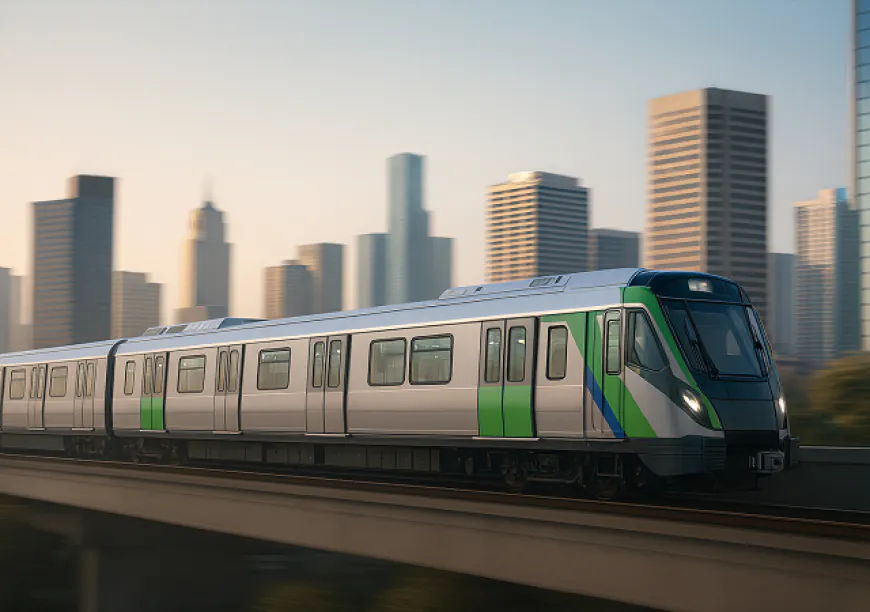Mumbai Metro Line 4: 39 Driverless Alstom Trains Begin Trials September
Mumbai Metro Line 4: 35.3km automated, 39 Metropolis Alstom trains, CBTC Grade 4. Trials September 2025, opening February 2026. Make in India.

Mumbai takes a decisive step in modernizing urban transport with Metro Line 4, also called the Green Line. This 35.3km elevated corridor connecting Wadala to Kasarvadavali integrates 39 automated Metropolis trains from Alstom and cutting-edge CBTC technology. Trials begin September 2025 for partial opening planned February 2026.
Mumbai Metro Line 4 represents one of India's most ambitious urban transport projects, combining advanced technologies with local production under the "Make in India" initiative. This automated system will transform mobility for 18 million inhabitants of the Mumbai metropolitan area.
Mumbai Metro Line 4 & 4A: Connecting Strategic Hubs
Main Line: 35.3km Elevated Corridor
Mumbai Metro Line 4 constitutes a 35.3-kilometer elevated corridor connecting Wadala in Central Mumbai to Kasarvadavali in Thane, serving 32 stations. This infrastructure ranks among the city's longest metro lines, positioned as the backbone of metropolitan public transport.
4A Extension and Interconnections
The 2.7-kilometer extension (Line 4A) will extend services to Gaimukh. The entire Green Line network, including Lines 4, 4A (Kasarvadavali-Gaimukh), and 10 (Gaimukh-Shivaji Chowk, Mira Road), will connect Mira Bhayandar to Wadala across an exceptional total route.
Depot and Control Center
The system will use Mogharpada depot with backup control center, complemented by an interim depot installed beyond Gaimukh terminal. This technical infrastructure ensures rolling stock maintenance and operational supervision.
Context & Stakes: Mumbai Transport Modernization
Urban Congestion Challenge
Mumbai, India's financial capital, faces chronic road congestion impacting its 18 million inhabitants. Line 4 aims to decongest the Eastern Express Highway and offer a low-carbon alternative to private travel, aligning with sustainable development goals.
Integration with Existing Network
The line will interconnect with Mumbai Monorail (Line 1 at Bhakti Park) and other existing metro lines. This multimodal integration optimizes territorial coverage and streamlines transfers for users.
What Changes for Users and Transport Stakeholders
Revolutionized Passenger Experience
The 39 Metropolis trains will offer air conditioning, wheelchair accessibility, bike spaces, and air circulation cooling systems. GoA4 automation guarantees punctuality and optimal frequencies, transforming "agonizing hours into smooth rides" according to local authorities.
Technical Capacity and Performance
The CBTC system enables close train intervals, significantly increasing operational bandwidth. This technology reduces human error and optimizes frequencies, crucial for managing demand in a metropolis of this scale.
Alstom's Global Contribution: Rolling Stock, Signaling, and Maintenance
Contract Worth "Few Hundred Million Euros"
Alstom secured from Larsen & Toubro a comprehensive contract including supply of 39 Metropolis trains (234 cars), complete CBTC installation, and five years of operational and maintenance support. This partnership illustrates confidence in French technologies.
Cutting-Edge Urbalis CBTC Technology
Alstom's Urbalis system enables GoA4 (Grade of Automation 4) automation across the 35.3km line. The Urbalis Vision platform will equip the Operational Control Center (OCC) at Mandale depot and Backup Control Center (BCC) at Mogharpada.
Exemplary "Make in India" Initiative
The 39 trains will be designed at Alstom's Bangalore engineering center and manufactured at the Sri City facility (Andhra Pradesh). Propulsion systems come from Coimbatore (Tamil Nadu) and bogies from Savli (Gujarat), demonstrating Alstom's local industrial anchoring (source: Alstom India, 2025).
Advanced Technologies: CBTC and Cybersecurity
CBTC: Optimized Solution for Metros
The system enables frequent, fast, safe, and comfortable journeys by reducing intervals, improving safety and efficiency, and decreasing operational costs. A Ministry of Urban Development sub-committee recommends CBTC as the common platform for future Indian metros.
Integrated Railway Cybersecurity
Alstom's cybersecurity solution, certified through approved development processes, protects critical infrastructure against emerging cyber threats. This security proves crucial for automated public transport systems.
Project Timeline and Operational Trials
Construction Since 2018-2019
Line 4 construction began October 2018, followed by Line 4A in September 2019. By 2022, Line 4 showed 37% progress, demonstrating this major infrastructure's complexity.
September 2025 Trials
Initial trials will cover a 10km section across 10 stations. First test trains are already positioned on tracks near Anand Nagar in Thane, with specifications matching final rolling stock.
Electrification and Progressive Opening
Electrification progresses over 4.68km between Dongripada and Gaimukha with 25,000-volt traction cables. Deputy Chief Minister Eknath Shinde confirms public opening during 2026, with partial operations planned February 2026 on the Gaimukh-Cadbury Junction section (10.5km).


 TrainsNews
TrainsNews 





